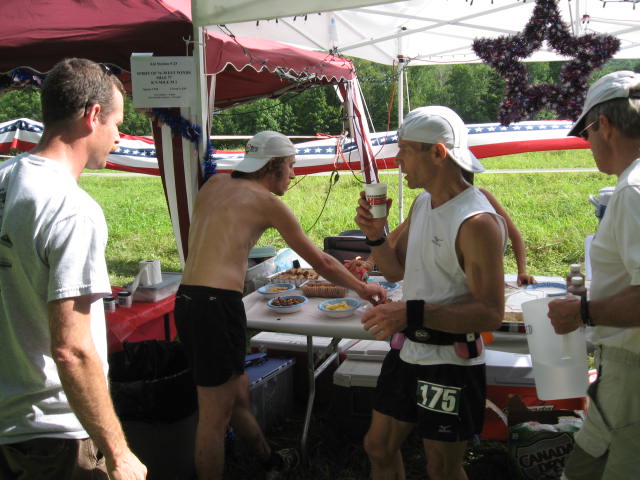Last year I wrote about hydrating your way through an ultramarathon, the importance of knowing how much fluid you need, how to figure that amount out, and what types of fluid to use. You can read that HERE!
And now, I shall discuss my other favorite topic: EATING! Getting your fluid intake right to avoid dehydration or over-hydration is of utmost importance. Also of huge significance is knowing how many calories per hour you should take in and what those calories should look like.
Man does not run 100 miles (or 100K) on fluid alone!
Below, some tips on how to fuel the fire for ultradistance racing!
- First, figuring out how many calories per hour that you will aim to take, is a good starting place. There are multiple factors that affect calorie goals: body weight, lean muscle mass and how “fat adapted” of an athlete you are, to name a few. This could range from 200 calories/hour to 500 calories/hour (and up!). In general, the leaner, lighter and more fat adapted you are, the lower your needs will be, and vice versa.
- If hydrating with sports drink, as my previous hydration article suggests, your sports drink will give you a decent start on your calorie needs. For example, if you are taking in 24 oz/hour of full strength sports drink (Gatorade Endurance, Tailwind, Base Hydro, etc…), that is roughly 45 grams of carbohydrate and 180 calories. This is a solid base from which to build! Now you must add in some “food” to make up the difference.
- What should that “food” be? Good question. In general, the longer the distance, the more you will need mixed foods, meaning not JUST simple carbohydrates, but also some protein and fat. On the other hand, if you are a speedy 100K runner that plans on finishing in 10-11 hours, you can get away with simple sugars alone. Sports drink, gels and chews are all good examples of simple sugars with no protein or fat. If going longer and wanting to add in the protein and fat, you could consider solids like Clif or Balance bars, chicken noodle soup, peanut butter and jelly squares or Pop Tarts. I know one ultra runner in particular who SWEARS by Ritz Bits peanut butter crackers. Point is, you need to find something you like and that agrees with you and something that travels well/is easy to carry.
- Another important piece of advice is to eat at regular intervals and set up a schedule that requires very little thinking. Deep into a 24-hour race, you don’t want to have to be calculating grams of carbohydrate/hour! I recommend setting up a cycle that you repeat over and over. For example, if you think you will be racing for 20 hours, consider doing five 4 hour cycles. In those four hours you drink 4 bottles of sports drink (1 per hour) then you may eat: one (1) gel at 1:00, 1 oz pretzels at 2:00, three (3) chews at 3:00, ½ Clif Bar at 4:00. Next, you repeat the cycle four more times. Keep it as simple as possible so you don’t have to waste precious energy on thinking about nutrition!
- Probably THE most important piece of this puzzle is to PRACTICE, PRACTICE, PRACTICE and then practice some more. You will have plenty of long training days to practice drinking to your fluid needs, and eating the same foods, at the same intervals, that you will in the race. Practice so much so, that the nutrition part of the race is second nature and one less concern you have! Your body will know what to expect.
- And finally, SHOULD the stomach go sour, you will need to do some problem solving. Don’t continue to force nutrition in if it’s making you sick and it will only come back up! Take some time to let the body and stomach settle. And think what could be causing the issue. Is it really hot and your HR is high? Slow a bit, get your core body temperature down (think water over the head!) and then your other systems (GI system included) will start to work better. Are you simply sick of the sweet, sugary taste and can’t choke down another gel? Take a gel off and instead eat something salty and non-sweet like 1 oz of pretzels. The carbohydrate content is roughly the same! Are you really just craving watermelon above all things? Well this one is easy – EAT WATERMELON at the next aid station!
I hope this gets you thinking about how you will fuel your ultra marathon training and racing. Making it a priority and paying close attention to it will put you in a great place to let your true run fitness shine through!
If you are interested in having a registered dietitian figure out your needs and help guide you in a race fueling stragey, check out the fueling plans offered by The Core Diet.
Beth Shutt is a registered dietitian and the Operations Director at The Run Formula. She’s been an endurance athlete for over 25 years, including racing professional triathlon for 6 years. She has made every nutrition mistake in the book and loves to help people NOT make the same mistakes. She can be reached at beth@therunformula.com.















Comments